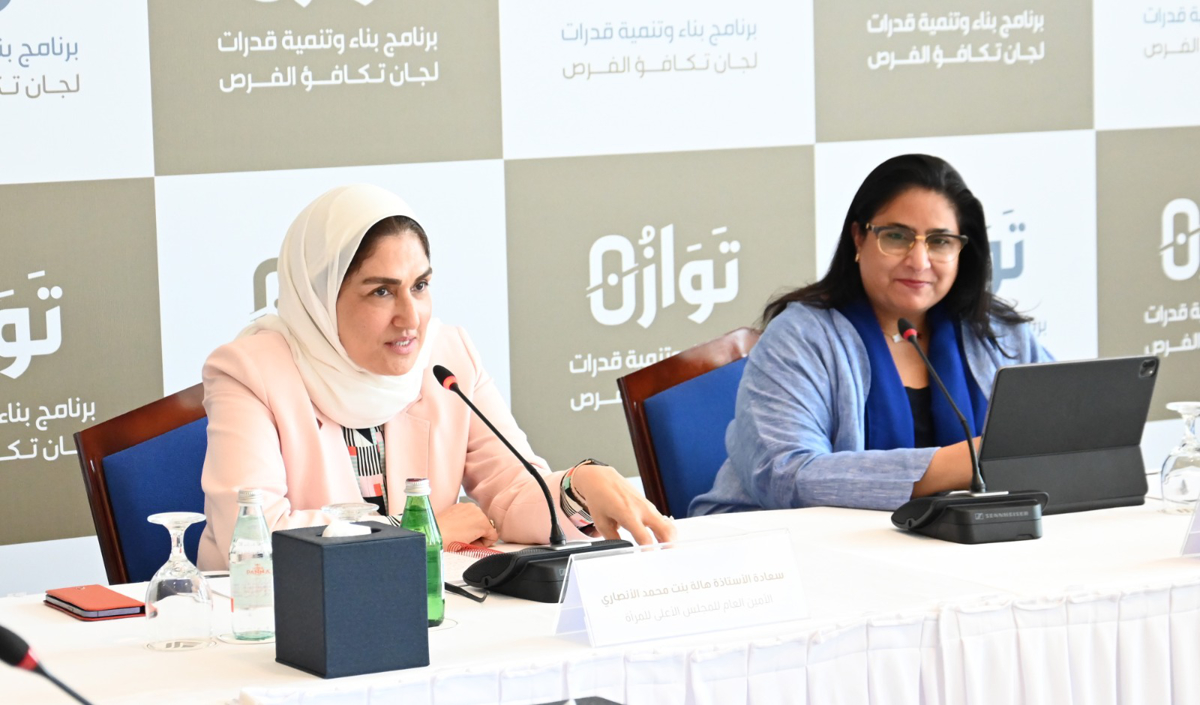UN Women supports launch of the Tawazon programme to develop the capacity of Bahrain’s Equal Opportunities Committees
Date:

On 12 November 2023, the Supreme Council for Women and the Institute of Public Administration of the Kingdom of Bahrain launched the innovative Tawazon programme to strengthen the capacity of members of the public sector Equal Opportunities Committees. The Tawazon programme comprises a training of trainers workshop, followed by the roll-out of training for the members of Equal Opportunities Committees based in each ministry and government entity. Participants will benefit from training on gender mainstreaming through application of the National Gender Balance Model, looking at areas such as policy and legislation, gender-responsive budgeting, and knowledge management and including practical case studies to assess gender mainstreaming in governmental entity strategies and workplans.
The creation of Equal Opportunity Committees in Bahrain was mandated by Civil Service Council Decree in 2014. In less than a decade, 60 Committees have been established across the Bahraini public sector entities, chaired at the level of assistant under-secretary or higher. The Committees have facilitated effective analysis of entity policies, strategies and workplans from a gender-balance perspective and supported necessary decision-making to advance the implementation of the National Gender Balance Model in line the National Plan for the Advancement of Bahraini Women.
H.E. Mrs. Hala Bint Mohammed Al-Ansari, Secretary-General of the Supreme Council for Women, introduced the Tawazon programme and highlighted that it is designed to facilitate effective and comprehensive implementation of the National Gender Balance Model to advance national development priorities. The Secretary-General highlighted the main achievements and impacts of implementing the model, including incorporating the National Plan for the Advancement of Bahraini Women in the governmental action plan and issuing the National Gender Balance Report. The Secretary-General also emphasized the importance of a gender-responsive approach to government entity plans and strategies for a wholistic approach to increasing women’s labour force participation and contribution to national discourse and development.
H.E. Dr. Shaikha Rana Bint Isa Al Khalifa, Director General of the Institute of Public Administration, welcomed the strategic partnership with the Supreme Council for Women to launch the Tawazon programme which aims to ensure institutional excellence by building and developing the capacity of members of equal opportunities committees in the public sector. The Director emphasized the importance of cultivating institutional awareness of gender balance, equal opportunities and mainstreaming the needs of Bahraini women in national development to ensure the continuous implementation of initiatives under the National Plan for the Advancement of Bahraini Women.
Welcoming the launch of the training programme, Josephine Moss, UN Women Regional Coordination Specialist, congratulated SCW and the IPA on this example of collaborative innovation. She noted the critical role of the public sector to drive achievement of Bahrain’s National Development Plan as well as Bahrain’s commitments under international frameworks including Agenda 2030 for Sustainable Development and the Beijing Platform for Action. The international community has now passed the half-way mark to achieve Agenda 2030 and the Sustainable Development Goals, and SDG 5: achieve gender equality and empower all women and girls, is lagging behind.
The Tawazon programme complements the Parliamentary Toolkit launched by the Supreme Council for Women in March this year, designed to support parliamentarians to apply gender analysis to the development and adoption of new legislation.